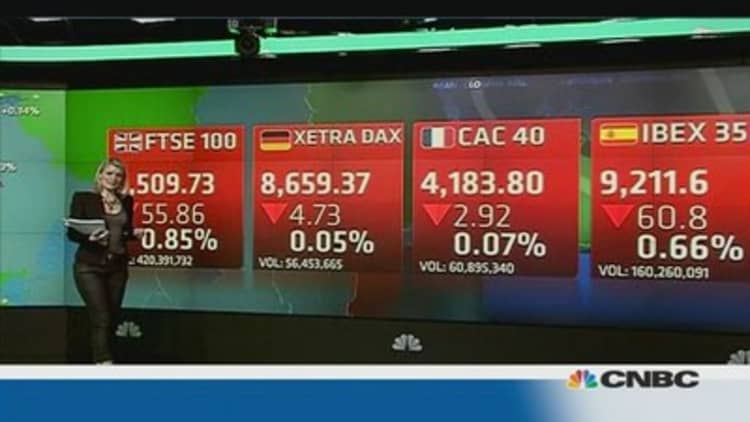
European shares closed down on Friday, as a growing political crisis in Italy weighed on sentiment, combined with continual U.S. debt worries.
The pan-European provisionally closed down 0.3 percent to 1,254.03 points, with the Italian FTSE MIB Index losing 1.3 percent, after the country had to pay the highest yield since June to borrow over 10-years at an auction, reflecting worries that economic reforms may be derailed if the government collapses.
Italian prime minister Enrico Letta flew back from a trip to New York on Friday to meet with the country's president and try to resolve a political crisis that is threatening to tear the government apart.
The two will meet to discuss a tense political situation after Silvio Berlusconi's center-right People of Freedom (PDL) party issued a threat on Wednesday to pull out of the country's fragile coalition government.
(Read More: Italy crisis rages as Berlusconi 'crunch time' nears)
Wolf Piccoli, managing director at Teneo Intelligence, told CNBC Friday that the situation is very volatile but did not expect any fresh elections to be called.
"(It's) crunch time for Berlusconi," he said. "He knows over the next three or four weeks that it is basically the last phase of his political battle."
U.S. stocks were sharply lower Friday, with major averages poised to finish lower for the week, following the latest consumer sentiment report and as mounting concerns of a potential government shutdown weighed on markets.
Congress must reach an agreement on the budget before October 1, next Tuesday, to prevent a government shutdown that could result in federal employees taking unpaid temporary leave and a delay in the payment of military personnel.
Reuters reported on Wednesday that Senior Republican Jeff Sessions said there will be no shutdown or government default. House speaker John Boehner said a Republican proposal is coming that will tie federal government spending cuts to a U.S. debt limit increase.
(Read More: Brawl in US Congress—should the world care?)
On the data front, the European Commission released figures on Friday showing that euro zone confidence picked up in September. An economic sentiment index, that gauges both businesses and consumers, rose to 96.9 in September from 95.3 in August, reaching its best level for two years.
Nationwide released its house price index for the U.K. which showed a 5 percent (year-on-year) rise amid growing concerns that stimulus in the country is fueling a bubble in prices.
House builder led Britain's FTSE lower on the prospect of less stimulus from the Bank of England and signs that politicians are fearful of a property bubble. Persimmon shed 4.3 percent by the day's close. The FTSE 100 closed the day down 0.9 percent, ending the whole week lower by 1.31 percent.
Consumer spending figures for France met expectations with a 0.4 percent (month-on-month) rise, while Spanish retail sales showed a continued slump with a fall of 4.5 percent (year-on-year).
In stocks news, German-listed shares in surged by 4.86 percent after it reported earnings on Thursday evening that beat Wall Street forecasts. Shares of also received a bounce of 0.98 percent on the news.
Shares of Danish energy firm rose by 4.51 percent on Friday after it announced a joint venture with Japanese company Mitsubishi Heavy Industries.
Shares of - the French steel-tube maker - sank by 8.2 percent after it announced sales growth had been hit by weak sales in Brazil.
, the Milan-listed oil services firm was the top individual faller in Europe, down 4 percent, caused not just by the Italian political crisis but due to Bank of America Merrill Lynch's downgrade of the company to "neutral" from "buy".

